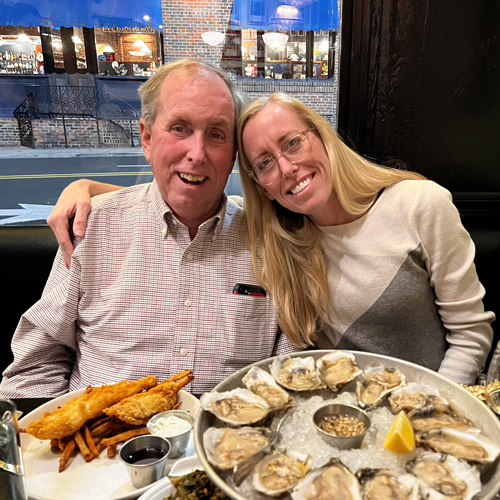
Jeff Peirce (left) and Shayn Peirce-Cottler (contributed photo)
The School of Medicine appointed Shayn Peirce-Cottler, PhD as chair of the Department of Biomedical Engineering on September 15, 2022. She is both a graduate of the Department of Biomedical Engineering and a faculty member for the past 18 years. We recently sat down with Professer Peirce-Cottler and learned more about her life, career, and how her Dad has been a significant role model in her life, encouraging her to strive daily to be her “best self.”
Q: Why did you choose the University of Virginia School of Medicine Department of Biomedical Engineering?
A: I am an alum of UVA’s PhD program in Biomedical Engineering. I graduated 25 years ago – and I have always been impressed by the collaborative and collegial culture at UVA, the care and concern we express for the training and professional development of our students, and the fact that the BME Department is situated in both the School of Medicine and the School of Engineering and Applied Science. Being rooted in both schools, biomedical engineers at UVA work in close collaboration with other researchers and clinicians in the School of Medicine to develop and use engineering innovations in order to solve problems in human health – enabling our work to have a more profound and immediate impact on improving the lives of patients.
Q. Why did you become an academic basic science researcher and choose your field of study?
A: I chose to become a biomedical engineer to help people, first and foremost, and also because I was fascinated by the idea that “soft and squishy” biology could be studied through the quantitative and applied “rigid and reliable” lenses of math and physics. I first learned about biomedical engineering when I was in 11th grade growing up in Chapel Hill, N.C. My Dad was a Professor of Environmental Engineering at Duke, and I was excited by spending time in his lab and hearing about the inventions that he and his students created together. I was also a competitive swimmer, which fueled my curiosity about human physiology, performance, injury, and healing. Biomedical engineering, which combines basic science discovery with engineering design and problem solving to help patients and medical care providers, was a perfect fit for my motivation and interests – and that remains true 32 years later.
Q: What’s the most exciting thing happening in your field right now?
A: There are so many exciting things happening in our field right now, it is impossible to highlight just one. When it comes to biomedical engineering research and design, the methods and approaches that biomedical engineers are developing to measure and integrate read-outs of human health and disease through biomedical imaging, biomarker assays, biosensors, high-throughput “omics”-approaches, data science approaches, and multiscale computational modeling, are more powerful than ever. They are yielding novel insights and therapeutic approaches that are tailored to the individual patient with incredible specificity and fidelity that has never been achieved before. When it comes to educating the next generation of biomedical engineering leaders, our field – with our own department leading the way – is revamping curriculums and training experiences to provide learners with a deep education in the societal determinants of health and healthcare disparities and how engineers can – and need to – incorporate those factors into all of our studies and designs.
Q: Who is your inspiration or hero?
A: I have so many inspiring heroes – and mentors – and I am so grateful for their continued support, which enables me to strive to be my “best self” every day. My Dad, Jeff Peirce, PhD is the hero I would like to highlight because we share March birthdays and he has been a role model for me in so many ways throughout my entire life. My Dad has demonstrated the importance of always serving others first, being unafraid of failure and embracing opportunities to try new things (especially if they are challenging), and working hard while balancing all of the other important aspects of life, like family and friends. He also gave me my love of eating raw oysters, which we love to share when celebrating our birthdays together (see picture).
Filed Under: Faculty
